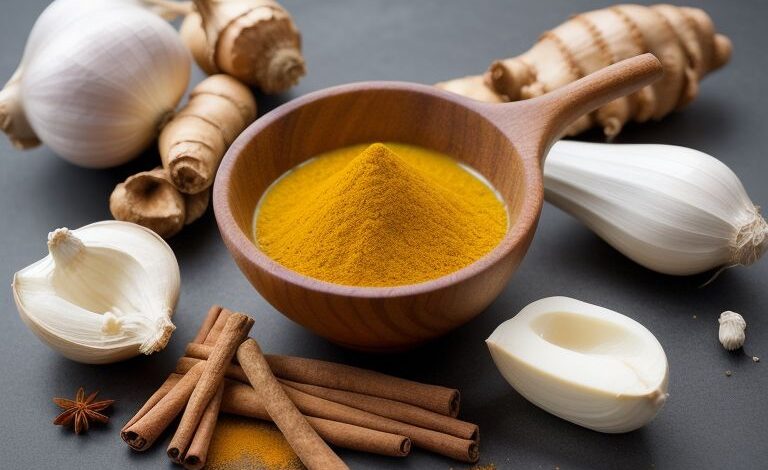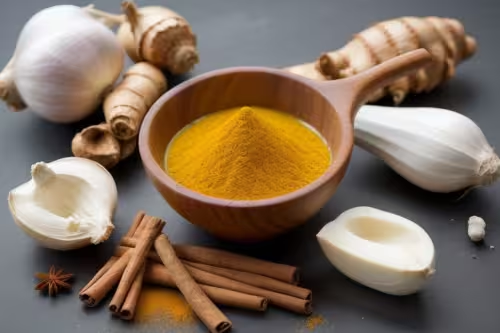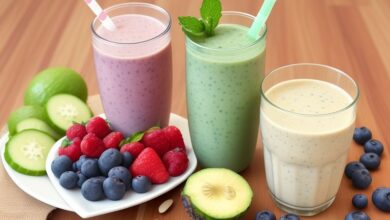Natural Antibiotic Foods: 20 Powerful Foods to Boost Immunity and Fight Infections

In an age where antibiotic resistance is becoming an increasing concern, many people are turning to natural remedies to prevent and fight infections. Natural antibiotic foods offer a safe and effective way to boost your immune system and protect your body against harmful bacteria, viruses, and other pathogens. Not only do these foods help combat infections, but they also provide a range of essential nutrients that support overall health.
In this article, we’ll explore 20 of the most potent natural antibiotic foods, explain how they work, and provide tips on how to incorporate them into your daily diet. Whether you're looking for preventive measures or natural solutions to common infections, these foods can play a key role in maintaining a healthy, resilient body.

What Are Natural Antibiotic Foods?
Natural antibiotic foods are those that contain compounds known to kill or inhibit the growth of harmful microorganisms such as bacteria, viruses, and fungi. These foods often contain antimicrobial, antibacterial, or antiviral properties, making them a great addition to your diet for infection prevention.
Unlike pharmaceutical antibiotics, which can cause side effects and lead to antibiotic resistance, natural antibiotic foods support the body’s own defenses while promoting overall well-being.
Top 20 Natural Antibiotic Foods to Include in Your Diet
1. Garlic
Garlic is one of the most well-known natural antibiotics. It contains a compound called allicin, which has strong antibacterial, antifungal, and antiviral properties. Studies show that garlic can be effective against a variety of pathogens, including the bacteria responsible for food poisoning.
How to Use: Add crushed garlic to your dishes, or take garlic supplements for a more concentrated dose.
2. Ginger
Ginger is rich in gingerol, a bioactive compound with potent antimicrobial properties. Research indicates that ginger can help fight respiratory infections, reduce inflammation, and boost immunity.
How to Use: Incorporate fresh or powdered ginger into teas, smoothies, and soups for a health boost.
3. Honey
Honey, particularly manuka honey, has been used for centuries as a natural wound healer due to its strong antibacterial properties. It contains hydrogen peroxide and methylglyoxal, which make it effective against bacteria such as E. coli and Staphylococcus aureus.
How to Use: Use raw honey as a sweetener in drinks or apply it topically to wounds for its healing properties.
4. Turmeric
Turmeric contains curcumin, a powerful antioxidant with antibacterial, antiviral, and antifungal properties. Turmeric can help combat bacterial infections and reduce inflammation, making it a great addition to your diet.
How to Use: Use turmeric in curries, soups, or golden milk. Combining it with black pepper enhances its absorption.
5. Apple Cider Vinegar
Apple cider vinegar (ACV) contains acetic acid, which has strong antibacterial and antiviral effects. It’s often used as a natural remedy for sore throats, digestive issues, and skin infections.
How to Use: Dilute 1-2 tablespoons of ACV in water and drink it before meals, or use it as a salad dressing.
6. Onions
Onions are closely related to garlic and share similar antibiotic properties. They contain sulfur compounds and quercetin, both of which have been shown to inhibit bacterial growth.
How to Use: Include onions in salads, stir-fries, and soups to enjoy their health benefits.
7. Oregano
Oregano is packed with carvacrol and thymol, two compounds with potent antimicrobial effects. Oregano oil is a powerful natural antibiotic that can combat bacterial and fungal infections.
How to Use: Use dried oregano in cooking or take oregano oil supplements to boost your immune system.
8. Coconut Oil
Coconut oil contains lauric acid and caprylic acid, which have strong antibacterial, antiviral, and antifungal properties. It’s effective against bacteria like Staphylococcus and Candida infections.
How to Use: Use coconut oil in cooking or apply it topically for skin infections.
9. Cinnamon
Cinnamon contains cinnamaldehyde, a compound with strong antimicrobial and anti-inflammatory effects. It has been shown to fight bacteria, fungi, and viruses.
How to Use: Add cinnamon to your oatmeal, smoothies, or baked goods for a delicious and healthy boost.
10. Echinacea
Echinacea is a popular herb known for its immune-boosting and antibiotic properties. It helps increase the production of white blood cells, which fight off infections.
How to Use: Echinacea can be consumed as a tea or supplement to prevent and treat colds, flu, and respiratory infections.
11. Cloves
Cloves contain eugenol, a compound with strong antimicrobial and antifungal properties. Clove oil is often used to treat toothaches, oral infections, and digestive issues.
How to Use: Use whole or ground cloves in cooking, or apply clove oil to treat oral infections.
12. Thyme
Thyme contains thymol, which has antiseptic and antibacterial properties. Thyme essential oil is often used to treat respiratory infections and boost the immune system.
How to Use: Add thyme to your cooking or inhale thyme essential oil for respiratory relief.
13. Lemon
Lemons are rich in vitamin C and antioxidants, which help boost the immune system and fight infections. Lemon juice also has antibacterial properties.
How to Use: Add fresh lemon juice to your water, tea, or salad dressings for a refreshing and immune-boosting kick.
14. Horseradish
Horseradish contains isothiocyanates, which have antimicrobial properties that help fight respiratory and urinary tract infections.
How to Use: Grate horseradish into sauces, dressings, or spreads to enjoy its antibiotic benefits.
15. Fermented Foods (Yogurt, Kimchi, Sauerkraut)
Fermented foods are rich in probiotics, which promote gut health and boost the immune system. A healthy gut is essential for fighting off harmful bacteria and infections.
How to Use: Include probiotic-rich foods like yogurt, kimchi, and sauerkraut in your diet to support your immune system.
16. Pineapple
Pineapple contains bromelain, an enzyme with anti-inflammatory and antibacterial properties. Bromelain helps reduce mucus and fight respiratory infections.
How to Use: Enjoy fresh pineapple as a snack, or add it to smoothies and salads for a sweet, immune-boosting treat.
17. Cabbage
Cabbage is rich in sulfur compounds that help fight infections and support detoxification. It’s also a great source of vitamin C, which boosts immunity.
How to Use: Add cabbage to soups, stews, or salads, or enjoy it fermented as sauerkraut.
18. Basil
Basil contains essential oils like eugenol, which have antibacterial and anti-inflammatory properties. Basil is particularly effective against bacteria that cause foodborne illnesses.
How to Use: Add fresh basil to salads, pasta dishes, and sauces for an extra flavor and health boost.
19. Peppermint
Peppermint has antimicrobial and antiviral properties, making it effective against respiratory and digestive infections. It also helps relieve symptoms of colds and flu.
How to Use: Drink peppermint tea, or use peppermint oil for inhalation therapy or topical application.
20. Cranberries
Cranberries contain proanthocyanidins, which prevent bacteria from adhering to the urinary tract walls, making them effective in preventing and treating urinary tract infections (UTIs).
How to Use: Drink unsweetened cranberry juice or add fresh cranberries to salads and smoothies.
How to Maximize the Benefits of Natural Antibiotic Foods
Incorporating these natural antibiotic foods into your daily diet is a great way to enhance your body’s defenses. Here are a few tips to get the most out of these foods:
- Eat a Variety: Different foods offer different antimicrobial compounds, so aim for a diverse diet to target various pathogens.
- Use Fresh Ingredients: Whenever possible, choose fresh garlic, ginger, and herbs over processed versions for maximum potency.
- Be Consistent: Regular consumption of these foods is key to keeping your immune system strong.
- Pair with Immune-Boosting Habits: In addition to eating these foods, practice good hygiene, get enough sleep, and exercise regularly to support your immune system.
Frequently Asked Questions (FAQ)
1. Are natural antibiotic foods effective against serious infections?
Natural antibiotic foods can help prevent and fight mild to moderate infections, but they are not a replacement for prescription antibiotics in the case of serious infections. Always consult a healthcare provider for severe conditions.
2. Can I use natural antibiotics every day?
Yes, many of these foods can be consumed daily as part of a healthy diet. However, it’s important to balance your diet and not rely solely on one food for antibiotic effects.
3. Is it safe to use natural antibiotics for children?
Many natural antibiotic foods, like garlic, honey (for children over 1 year), and yogurt, are safe for children. However, always consult with a pediatrician before using essential oils or supplements for children.
4. Can natural antibiotic foods help with antibiotic resistance?
Natural antibiotic foods may help reduce the need for pharmaceutical antibiotics, thus potentially slowing the development of antibiotic resistance. However, more research is needed in this area.
5. Can pregnant women consume natural antibiotic foods?
Many natural antibiotic foods are safe during pregnancy, but it’s best to consult a healthcare provider before using potent herbs or supplements, such as oregano oil or echinacea, during pregnancy.
By adding these powerful natural antibiotic foods to your diet, you can strengthen your immune system and protect your body against infections. Always aim for a balanced and nutrient-rich diet to promote overall health and well-being.


